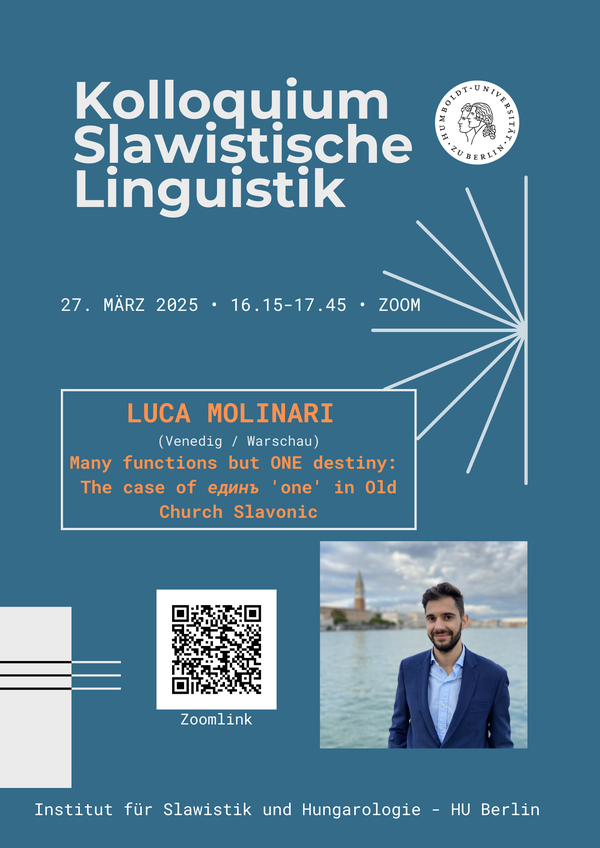Vortrag Luca Molinari (Kolloquium Slawistische Linguistik)
- https://www.slawistik.hu-berlin.de/de/veranstaltungen/slawling/molinari25
- Vortrag Luca Molinari (Kolloquium Slawistische Linguistik)
- 2025-03-27T16:15:00+01:00
- 2025-03-27T17:45:00+01:00
- Wann 27.03.2025 von 16:15 bis 17:45
- Wo zoom
- Name des Kontakts Berit Gehrke
- Web Externe Webseite besuchen
-
iCal
27.03. Luca Molinari (Venedig/Warschau): Many functions but ONE destiny: The case of единъ 'one' in Old Church Slavonic [zoom]
Several philologists have observed that edinъ ‘one’ could carry out indefinite functions already in Old Church Slavonic (OCS) (Vaillant 1962; Georgiev 1978; Haralampiev 2001 a.o.). This observation, however, is not accompanied by fine-grained studies which look at all the occurrences of this lexeme in a particular manuscript. In this talk, I report the results of a detailed analysis of all the instances of edinъ in four OCS manuscripts. Since these texts are translations of the Greek New Testament, I also consider the corresponding Greek semantic units that edinъ translates. The outcome is that edinъ had a wide array of functions, encompassing both numeral and non-strictly-numeral ones. Furthermore, the indefinite use of edinъ is not widespread in all the analyzed manuscripts, but variation with the indefinite eterъ ‘some’ is found, pointing at an incipient stage of grammaticalization and/or to a specialization of the two lexemes for different registers.
This analysis bridges the discussion on the origin of edinъ as a unique lexeme, derived via univerbation of *ed- (probably meaning ‘only’) and *jьnъ (< I.E. oynos ‘one’) (Vaillant 1962; Comrie 1992; Blažek 1999). I propose a possible reason to account for this process, as a combination of a semantic and a syntactic process. Semantically, the weakening of the upper bound of *jьnъ ‘one’ (given its atomicity core meaning) which lead to the need to strengthen it via the addition of *ed-. Syntactically, the univerbation of the two lexemes is justifiable as the result of a process of rebracketing and relabeling (Weiß 2019).

